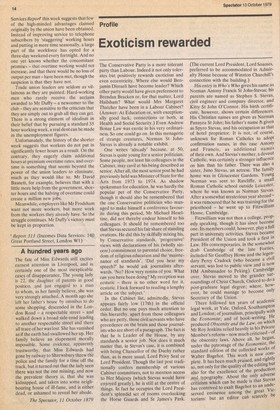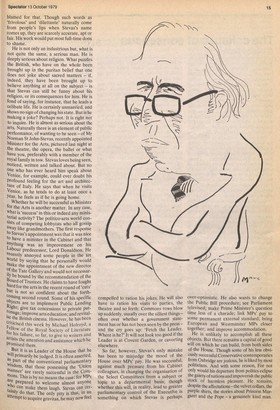Profile
Exoticism rewarded
The Conservative Party is a more tolerant party than Labour. Indeed it not only tolerates but positively rewards exoticism and even eccentricity. Where else would Benjamin Disraeli have become leader? Which other party would have given preferment to Brendan Bracken or, for that matter, Lord Hailsham? What would Mrs Margaret Thatcher have been in a Labour Cabinet? (Answer: At Education or, with exceptionally good luck, connections or both, at Health and Social Security.) Even Andrew Bonar Law was exotic in his very ordinariness. So one could go on. In this menagerie of strange creatures, Norman St JohnStevas is already a notable exhibit.
One writes 'already' because, at 50, Stevas is quite young for a senior politician. Some people, not least his colleagues in the Cabinet, may cavil at his being described as senior. After all, the most senior post he had previously held was Minister of State for the Arts from 1973 to 1974. As shadow spokesman for education, he was hardly the popular pet of the Conservative Party, though it should also be remembered that the one Conservative politician who managed to make himself a conference favourite during this period, Mr Michael Heseltine, did not thereby endear himself to his colleagues. It should be remembered too that Stevas secured his fair share of standing ovations. He did this by skilfully mixing his, by Conservative standards, 'progressive' views with declarations of his (wholly sincere) commitment to parental choice, freedom of religious education and the 'maintenance of standards'. 'Did you hear my speech?' he would ask journalists afterwards. 'No? How very remiss of you. What can you have been doing? My reception was ecstatic — there is no other word for it, ecstatic. I look forward to reading a lengthy article on the subject.'
In the Cabinet list, admittedly, Stevas appears fairly low (17th) in the official order. But no one pays much attention to this hierarchy, apart from those colleagues who are petty, those civil servants who have precedence on the brain and those journalists who are short of a paragraph. The fact is that he is Leader of the House, by any standards a senior job. Nor does it much matter that, in Stevas's case, it is combined with being Chancellor of the Duchy rather than, as is more usual, Lord Privy Seal or Lord President. Though the last post traditionally confers membership of various Cabinet committees, not to mention access to Her Majesty (which Stevas would have enjoyed greatly), he is still at the centre of things. In fact he occupies the Lord President's splendid set of rooms overlooking the Horse Guards and St James's Park. (The current Lord President, Lord Soames, preferred to be accommodated in Admiralty House because of Winston Churchill's connection with the building.) His entry in Who's Who gives his name as Norman Antony Francis St John-Stevas; his parents are named as Stephen S. Stevas, civil engineer and company director, and Kitty St John O'Connor. His birth certificate, however, shows certain differences. His Christian names are given as Norman Panayea St John; his father's name given as Spyro Stevas, and his occupation as that of hotel proprietor. It is not, of course, unknown for Roman Catholics to adopt confirmation names, in this case Antony and Francis, as additional names of their own. And Stevas's mother, a devout Catholic, was certainly a stronger influence on him than his father. There was also a sister, Juno Stevas, an actress. The family home was in Gloucester Gardens. Young Norman was sent to Ratcliffe, a small Roman Catholic school outside Leicester, where he was known as Norman Stevas. After a somewhat mysterious year abroad — it was rumoured that he was training for the priesthood — he went up to Fitzwilliam House, Cambridge.
Fitzwilliam was not then a college, properly speaking, though it has since become one. Its members could, however, play a full part in university activities. Stevas became President of the Union and took a first in Law. His contemporaries, in the somewhat drab Cambridge of the late Forties, included Sir Geoffrey Howe and the legendary Percy Cradock (who became a civil servant, was lost to public view and is now HM Ambassador to Peking). Cambridge over, Stevas moved to the grander surroundings of Christ Church, Oxford to do a post-graduate legal degree; where, however, he could manage to become only Secretary of the Union. There followed ten years of academic legal work, at Yale, Oxford, Southampton and London; of journalism, principally with the Economist; and of book-writing. He produced Obscenity and the Law, on which Mr Roy Jenkins relied heavily in his Private Member's reform — now much criticised — of the obscenity laws. Above all, he began, under the patronage of the Economist, the standard edition of the collected works of Walter Bagehot. This work is now .complete. It has been much praised, and rightly so, not only for the quality of the editing but also for the excellence of the production and typography. About the only adverse criticism which can be made is that Stevas has contrived to exalt Bagehot to an undeserved eminence among the great Victorians: but an editor can scarcely be blamed for that. Though such words as 'frivolous' and 'dilettante' naturally come from people's lips when Stevas's name comes up, they are scarcely accurate, apt or fair. His work would put most full-time dons to shame.
He is not only an industrious but, what is not quite the same, a serious man. He is deeply serious about religion. What puzzles the British, who have on the whole been brought up in the puritan belief that one does not joke about sacred matters — if, indeed, they have been brought up to believe anything at all on the subject — is that Stevas can still be funny about his religion, or its consequences for him. He is fond of saying, for instance, that he leads a celibate life. He is certainly unmarried, and shows no sign of changing his state. But is he making a joke? Perhaps not. It is right not to inquire. He is almost as serious about the arts. Naturally there is an element of public performance, of wanting to be seen — of Mr Norman St John-Stevas, recently appointed Minister for the Arts, pictured last night at the theatre, the opera, the ballet or what have you, preferably with a member of the royal family in tow. Stevas loves being seen, noticed, written and talked about. But no one who has ever heard him speak about Venice, for example, could ever doubt his Profound feeling for the art and architecture of Italy. He says that when he visits Venice. as he tends to do at least once a Year, he feels as if he is going home. Whether he will be successful as Minister for the Arts is another matter. In any case, What is 'success' in this or indeed any ministerial activity? The politico-arts world consists of competing lobbyists who all gossip away like grandmothers. The first response to Stevas's appointment was that it was nice to have a minister in the Cabinet and that anything was an improvement on his Labour predecessor, Lord Donaldson. He recently annoyed some people in the art World by saying that he personally would Make the appointment of the new director Of the Tate Gallery and would not necessarily be bound by the recommendation of the Board of Trustees. He claims to have fought hard for the arts in the recent round of 'cuts' but is not so confident about the forthcoming second round. Some of his specific objects are to implement Public Lending Right; give tax concessions to private patronage; improve arts education; and revitalise the British cinema. However, he has been criticised this week by Michael Holroyd, a ellow of the Royal Society of Literature tor. his failure, so far, to give to writers and artists the attention and assistance which he promised them. But it is as Leader of the House that he Will primarily be judged. It is often asserted, as part of the conventional parliamentary Wisdom, that those possessing the 'Union manner' are rarely successful in the Commons. This is by no means the case: for MPs are prepared to welcome almost anyone Who can make them laugh. Stevas can certainly do that. The only pity is that, in an attempt to acquire gravitas, he may now feel compelled to ration his jokes. He will also have to ration his visits to parties, the theatre and so forth: Commons rows blow up suddenly, usually over the silliest things — often over whether a government statement has or has not been seen by the press — and the cry goes up: 'Fetch the Leader. Where is he?' It will not look too good if the Leader is at ,Covent Garden, or cavorting elsewhere.
So far, however, Stevas's only mistake has been to misjudge the mood of the House over MN: pay. He was successful, against much pressure from his Cabinet colleagues, in changing the organisation of the Select Committees from a subject or topic to a departmental basis; though whether this will, in reality, lead to greater parliamentary control of the ExecutiVe is something on which Stevas is perhaps over-optimistic. He also wants to change the Public Bill procedure; see Parliament televised; make Prime Minister's question time less of a charade; link MPs' pay to some permanent external standard; bring European and Westminster MPs closer together; and improve accommodation. He is unlikely to accomplish all these objects. But there remains a capital of good will on which he can build, from both sides of the House. Though some of his less obviously successful Conservative contemporaries from Oxbridge are jealous, he is liked by most politicians. And with some reason, For not only Would his departure from politics eclipse the gaiety of nations and impoverish the public stock of harmless pleasure. He remains, despite the affectations—the velvet collars, the purple shirts, the stories about Princess Margaret and the Pope — a genuinely kind man.



































 Previous page
Previous page